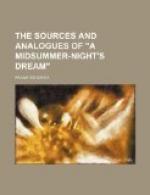Shakespeare may have read the tale in print. Sir Lambewell appears to have been printed about 1558,[62] and to have remained in circulation at least until 1575,[63] but no complete copy is now known. A single MS. version of 1650 survives, however, in the Percy Folio.[64] This is another translation from the same French original, but made by some one acquainted with Thomas Chestre’s version.
The story as told in the first of these manuscripts may be condensed as follows. Launfal had been ten years a steward to King Arthur before the King’s marriage. He did not like Guinevere, who gave him no gift at her wedding; so he asked leave of the King to go home and bury his father. He went to Caerleon, with two knights given him by Arthur, and sojourned with the mayor; but when his money was spent, he fell into debt, and his knights returned to Arthur’s court in rags; but at Launfal’s request, they gave out that he was faring well.
One day Launfal rode out in poor attire into the forest, and sat him under a tree to rest. After a while, two fair damsels, beautifully attired and bearing a gold basin and a silk towel, approached him, and bade him come speak with their lady, Dame Triamour, daughter to the King of Olyroun, king of fairy. Launfal was led to where the lady lay, and “all his love in her was light.”
On the morrow she promised him rich presents, and said she would come to him whenever he wished for her in a secret place; but he was never to boast of her love. Her presents came to him at the mayor’s house of Caerleon, and he spent his riches charitably.
The King, hearing of an exploit of Launfal’s, summoned him back to court. The Queen tempted him, but he repulsed her by saying he loved a fairer woman; this of course lost him Triamour. Guinevere (by a trick common in romances) accused Launfal to Arthur; but he was saved from disgrace by the appearance of Triamour, who then carried him off into fairy-land to Olyroun.
The romance of Sir Orpheo, a mediaeval version of the classical story of Orpheus and Eurydice, has come down to us in three manuscripts,[65] two of which are not quite complete, which are to be assigned to the fifteenth century at latest. As in the case of Launfal, it is doubtless a translation from the French; but as there is no extant original, this can only be presumed. Orpheus becomes Orpheo or Orfeo, and Eurydice becomes Erodys, Heurodis, or Meroudys; in the last the initial letter may be due to the m in “dame,” the word preceding it.
The story is told as follows.




